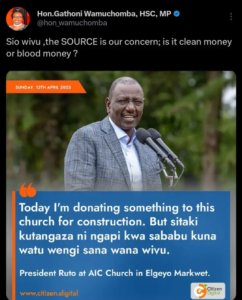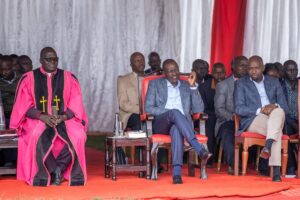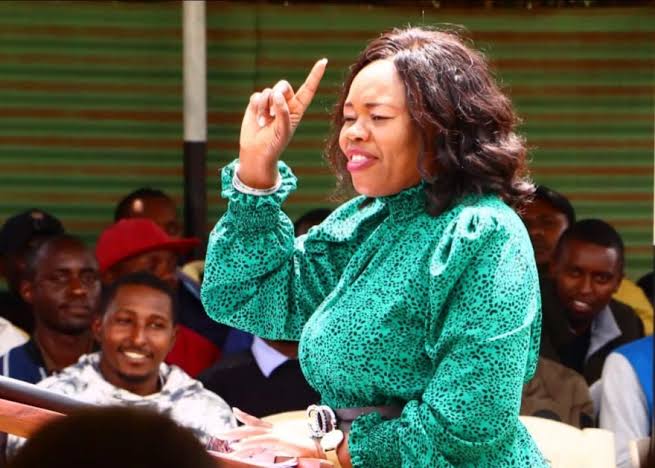Gathoni Wamuchomba, the Member of Parliament for Githunguri Constituency, has once again shaken the political table in Kenya.
Known for speaking her mind, even against her own party, UDA, Wamuchomba has now turned her focus to President William Ruto’s regular church donations. Her recent remarks questioning why the president refuses to reveal the exact amounts he donates every Sunday have sparked a storm across the country.
In a country already weighed down by a struggling economy, high taxes, and growing public debt, her question has hit a sensitive nerve.

A screenshot from Wamuchomba’s X handle questioning Ruto’s source of funds.
The issue is not just about how much money the president gives, but where that money comes from. Wamuchomba’s boldness has pushed a conversation that many Kenyans have only dared whisper about into the open. On social media, citizens are expressing deep frustration and concern.
Many do not see Wamuchomba’s remarks as an attack on faith or charity, but rather as a demand for accountability. Kenyans are asking why a leader whose government keeps seeking loans and foreign aid appears so wealthy and generous in public. It’s a contradiction that is hard to ignore.
The donations, often made during church fundraisers and events, are now being seen not just as acts of generosity but as signs of a deeper problem. Public servants are facing more taxes, businesses are closing, and the cost of living keeps rising.
Meanwhile, the president and top politicians seem untouched by the harsh economic reality. The contrast is too loud to go unnoticed. People want to know how leaders can afford to give millions when hospitals lack medicine and schools have no desks.

President William Ruto during yesterday’s Interdenominational Church Service, Kapng’etik, Elgeyo Marakwet County: Photo (X)
This debate has brought up larger questions about inequality and morality in leadership. Spiritual giving, which should be a personal and private matter, is now part of a wider political struggle. To many Kenyans, it feels like even religion is being used as a tool to control public opinion. They wonder if these generous acts are being used to distract people from bigger issues like corruption, misuse of public funds, or hidden wealth.
Gathoni Wamuchomba’s question may seem simple, but it carries the weight of a frustrated nation behind it. Her courage to speak openly has opened a door that may be difficult for the government to close. As the noise grows louder, it is clear that Kenyans are tired of watching leaders live large while they struggle to survive. The conversation is no longer about church donations alone, it is about trust, fairness, and the kind of leadership the country truly deserves.



